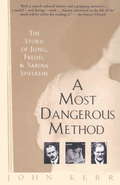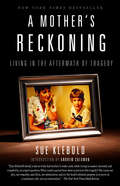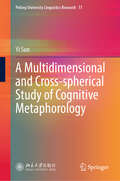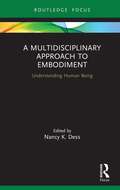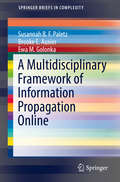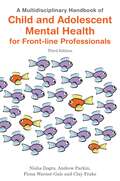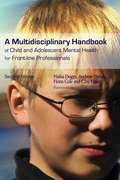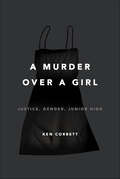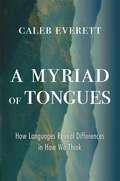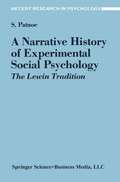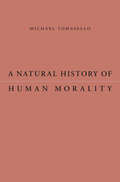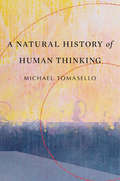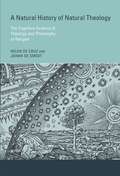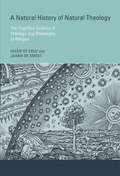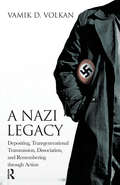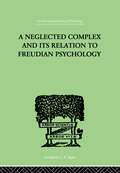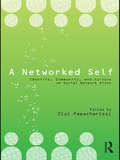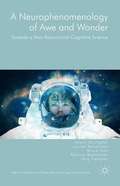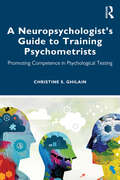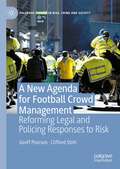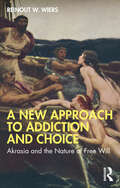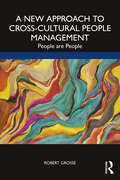- Table View
- List View
A Most Dangerous Method
by John KerrThis explosive, revelatory history of the early years of psychoanalysis shows that the bitterly unresolvable split between Jung and Freud pivoted around a former patient and lover of Jung's whose story and own potentially important theoretical contributions to psychoanalysis were blocked by both men. "A huge scholarly work . . . gripping". --The New York Times.
A Mother's Reckoning: Living in the Aftermath of Tragedy
by Andrew Solomon Sue KleboldOn April 20, 1999, Eric Harris and Dylan Klebold walked into Columbine High School in Littleton, Colorado. Over the course of minutes, they would kill twelve students and a teacher and wound twenty-four others before taking their own lives. For the last sixteen years, Sue Klebold, Dylan’s mother, has lived with the indescribable grief and shame of that day. How could her child, the promising young man she had loved and raised, be responsible for such horror? And how, as his mother, had she not known something was wrong? Were there subtle signs she had missed? What, if anything, could she have done differently? These are questions that Klebold has grappled with every day since the Columbine tragedy. In A Mother’s Reckoning, she chronicles with unflinching honesty her journey as a mother trying to come to terms with the incomprehensible. In the hope that the insights and understanding she has gained may help other families recognize when a child is in distress, she tells her story in full, drawing upon her personal journals, the videos and writings that Dylan left behind, and on countless interviews with mental health experts. Filled with hard-won wisdom and compassion, A Mother’s Reckoning is a powerful and haunting book that sheds light on one of the most pressing issues of our time. And with fresh wounds from the recent Newtown and Charleston shootings, never has the need for understanding been more urgent. Author profits from the book will be donated to research and to charitable foundations focusing on mental health issues— Washington Post, Best Memoirs of 2016
A Mother's Reckoning: Living in the Aftermath of Tragedy
by Andrew Solomon Sue KleboldOn April 20, 1999, Eric Harris and Dylan Klebold walked into Columbine High School in Littleton, Colorado. Over the course of minutes, they would kill twelve students and a teacher and wound twenty-four others before taking their own lives. For the last sixteen years, Sue Klebold, Dylan’s mother, has lived with the indescribable grief and shame of that day. How could her child, the promising young man she had loved and raised, be responsible for such horror? And how, as his mother, had she not known something was wrong? Were there subtle signs she had missed? What, if anything, could she have done differently? These are questions that Klebold has grappled with every day since the Columbine tragedy. In A Mother’s Reckoning, she chronicles with unflinching honesty her journey as a mother trying to come to terms with the incomprehensible. In the hope that the insights and understanding she has gained may help other families recognize when a child is in distress, she tells her story in full, drawing upon her personal journals, the videos and writings that Dylan left behind, and on countless interviews with mental health experts. Filled with hard-won wisdom and compassion, A Mother’s Reckoning is a powerful and haunting book that sheds light on one of the most pressing issues of our time. And with fresh wounds from the recent Newtown and Charleston shootings, never has the need for understanding been more urgent. Author profits from the book will be donated to research and to charitable foundations focusing on mental health issues— Washington Post, Best Memoirs of 2016
A Mother's Reckoning: Living in the Aftermath of Tragedy
by Sue Klebold<P>On April 20, 1999, Eric Harris and Dylan Klebold walked into Columbine High School in Littleton, Colorado. <P>Over the course of minutes, they would kill twelve students and a teacher and wound twenty-four others before taking their own lives. <P>For the last sixteen years, Sue Klebold, Dylan's mother, has lived with the indescribable grief and shame of that day. How could her child, the promising young man she had loved and raised, be responsible for such horror? And how, as his mother, had she not known something was wrong? Were there subtle signs she had missed? What, if anything, could she have done differently? These are questions that Klebold has grappled with every day since the Columbine tragedy. <P>In A Mother's Reckoning, she chronicles with unflinching honesty her journey as a mother trying to come to terms with the incomprehensible. In the hope that the insights and understanding she has gained may help other families recognize when a child is in distress, she tells her story in full, drawing upon her personal journals, the videos and writings that Dylan left behind, and on countless interviews with mental health experts. <P>Filled with hard-won wisdom and compassion, A Mother's Reckoning is a powerful and haunting book that sheds light on one of the most pressing issues of our time. And with fresh wounds from the recent Newtown and Charleston shootings, never has the need for understanding been more urgent. <P><b>A New York Times Bestseller</b>
A Multidimensional and Cross-spherical Study of Cognitive Metaphorology (Peking University Linguistics Research #11)
by Yi SunThis book aims to illustrate and explain the &“Cognitive Metaphorology&” from experiential and cultural perspectives and highlights two prominent features of cognitive metaphor: multidimensionality and cross-sphere application. This book demonstrates that embodied experience is the shared philosophical basis of commonalities underlying the similarities in these metaphors across Chinese and English; national and cultural factors introduce variations in metaphors between the two languages. The different cultural aspects revealed through metaphors related to human body parts, emotions, senses, time, colors, and animals may appeal to academic readers interested in language studies or diverse cultures.
A Multidisciplinary Approach to Embodiment: Understanding Human Being
by Nancy K DessThis is a collection of pithy and accessible essays on the nature and implications of human embodiment which explore the concept of ‘human being’ in the most unprecedented manner through seemingly disparate academic disciplines. With contributions from key researchers from around the world, this book engages with embodiment through the lens of "new materialism". It eschews the view that human beings are debased by materiality and creates a vision of humans as fully embodied creatures situated in a richly populated living planet. The essays in this volume will illustrate and foster new materialist thought in areas including psychology, astrophysics, geology, biology, sociology, philosophy, and the performing arts. The book’s engaging and enlightening content is made accessible to readers with relatively little background in the various academic disciplines. This is an important and fascinating text which invites readers to explore and expand their understanding and experience of embodiment. It will be particularly useful for postgraduate students and scholars of theoretical and philosophical psychology, philosophy of the mind, and social and cultural anthropology.
A Multidisciplinary Framework of Information Propagation Online (SpringerBriefs in Complexity)
by Susannah B. Paletz Brooke E. Auxier Ewa M. GolonkaThis book presents a broad, multidisciplinary review of the factors that have been shown to or might influence sharing information on social media, regardless of its veracity. Drawing on literature from psychology, sociology, political science, communication, and information studies, the book provides a high-level framework of information sharing. The framework progresses through different categories. Information is first acquired or viewed from different sources; then, the target sharer has emotional and cognitive reactions to that information. The next categories involve motivations to share and the actual ability and perceptions of that ability to share. The greater context, such as culture, language, and social networks, also influences information sharing. Finally, the book distinguishes between genuine and non-genuine (inauthentic) actors. This text will appeal to students and especially to technical researchers looking for a social science perspective.
A Multidisciplinary Handbook of Child and Adolescent Mental Health for Front-line Professionals, Third Edition
by Nisha Dogra Andrew Parkin Clay Frake Fiona Warner-GaleThis handbook provides a succinct introduction to child mental health, covering the nature, prevalence, treatment and management of mental health problems in children and young people. The authors explore a range of issues surrounding the emotional needs of young people, showing how specific problems such as ADHD and learning difficulties can be targeted, while also recognising diversity issues and paying particular attention to at-risk groups. This edition is updated to reflect current direction in services, cutting edge approaches to interventions in primary health care, teaching and social service settings, as well as incorporating children's views on what mental health means to them and the impact of social media. Setting out ways in which young people can be supported by all practitioners in primary care, and covering early years through to late adolescence, the authors have created an invaluable resource for any front-line practitioner working in this area.
A Multidisciplinary Handbook of Child and Adolescent Mental Health for Front-line Professionals: Second Edition
by Nisha Dogra Andrew Parkin Fiona Gale Clay FrakeThis fully updated edition of A Multidisciplinary Handbook of Child and Adolescent Mental Health for Front-line Professionals is an accessible introduction to child mental health, covering the nature, prevalence, treatment and management of mental health problems in children and young people. The authors explore issues such as assessing and meeting the mental health needs of young people, specific mental health problems such as attention deficit hyperactivity disorder (ADHD) and learning difficulties, and legal aspects of working with child mental health. They also assess diversity issues as an integral part of practice, and highlight practice issues for readers. The book contains illustrative case studies and self-directed exercises, and outlines the services available to children with mental health problems. This second edition also includes additional material on working with culture and diversity, plus the latest clinical guidelines and current medication. This handbook is an invaluable resource for students, trainers and professionals working with children with mental health problems in a medical and non-medical environment as well as parents wanting to know more about the subject.
A Murder Over a Girl: Justice, Gender, Junior High
by Ken CorbettTheNew York Times Book Review Editors' ChoiceA psychologist's gripping, troubling, and moving exploration of the brutal murder of a possibly transgender middle school student by an eighth grade classmateOn Feb. 12, 2008, at E. O. Green Junior High in Oxnard, CA, 14-year-old Brandon McInerney shot and killed his classmate, Larry King, who had recently begun to call himself "Leticia" and wear makeup and jewelry to school. Profoundly shaken by the news, and unsettled by media coverage that sidestepped the issues of gender identity and of race integral to the case, psychologist Ken Corbett traveled to LA to attend the trial. As visions of victim and perpetrator were woven and unwoven in the theater of the courtroom, a haunting picture emerged not only of the two young teenagers, but also of spectators altered by an atrocity and of a community that had unwittingly gestated a murder. Drawing on firsthand observations, extensive interviews and research, as well as on his decades of academic work on gender and sexuality, Corbett holds each murky facet of this case up to the light, exploring the fault lines of memory and the lacunae of uncertainty behind facts. Deeply compassionate, and brimming with wit and acute insight, A Murder Over a Girl is a riveting and stranger-than-fiction drama of the human psyche.
A Myriad of Tongues: How Languages Reveal Differences in How We Think
by Caleb EverettA sweeping exploration of the relationship between the language we speak and our perception of such fundamentals of experience as time, space, color, and smells.We tend to assume that all languages categorize ideas and objects similarly, reflecting our common human experience. But this isn’t the case. When we look closely, we find that many basic concepts are not universal, and that speakers of different languages literally see and think about the world differently.Caleb Everett takes readers around the globe, explaining what linguistic diversity tells us about human culture, overturning conventional wisdom along the way. For instance, though it may seem that everybody refers to time in spatial terms—in English, for example, we speak of time “passing us by”—speakers of the Amazonian language Tupi Kawahib never do. In fact, Tupi Kawahib has no word for “time” at all. And while it has long been understood that languages categorize colors based on those that speakers regularly encounter, evidence suggests that the color words we have at our disposal affect how we discriminate colors themselves: a rose may not appear as rosy by any other name. What’s more, the terms available to us even determine the range of smells we can identify. European languages tend to have just a few abstract odor words, like “floral” or “stinky,” whereas Indigenous languages often have well over a dozen.Why do some cultures talk anthropocentrically about things being to one’s “left” or “right,” while others use geocentric words like “east” and “west”? What is the connection between what we eat and the sounds we make? A Myriad of Tongues answers these and other questions, yielding profound insights into the fundamentals of human communication and experience.
A Narrative History of Experimental Social Psychology: The Lewin Tradition (Recent Research in Psychology)
by Shelley PatnoeA Narrative History of Experimental Social Psychology presents lengthy and intensive interviews with the contemporary scientists that founded and shaped the field of social psychology. The story of social psychology is told through the autobiographical narratives of leading figures, such as Dorwin Cartwright, Harold Kelley, Kurt Back, Robert Krauss, Stanley Schachter, and Leon Festinger. The author traces the beginning of the field from the close-knit group of students around Kurt Lewin to the major research groups responsible for the scientific origins of the discipline. The interviews offer unique insights into the beginnings of the fields and prospects for future trends.
A Natural History of Human Emotions (Books That Changed the World)
by Stuart WaltonA “fresh and entertaining” survey of the human emotional landscape—and how it has shifted over the centuries (Kirkus Reviews). Using Charles Darwin’s survey of emotions as a starting point, Stuart Walton’s A Natural History of Human Emotions examines the history of each of our core emotions—fear, anger, disgust, sadness, jealousy, contempt, shame, embarrassment, surprise, and happiness—and how these emotions have influenced both cultural and social history. We learn that primitive fear served as the engine of religious belief, while a desire for happiness led to humankind’s first musings on achieving a perfect utopia. Challenging the notion that human emotion has remained constant, A Natural History of Human Emotions explains why, in the last 250 years, society has changed its unwritten rules for what can be expressed in public and in private. Like An Intimate History of Humanity and Near a Thousand Tables, Walton’s A Natural History of Human Emotions is a provocative examination of human feelings and a fascinating take on how emotions have shaped our past.
A Natural History of Human Morality
by Michael TomaselloMichael Tomasello offers the most detailed account to date of the evolution of human moral psychology. Based on experimental data comparing great apes and human children, he reconstructs two key evolutionary steps whereby early humans gradually became an ultra-cooperative and, eventually, a moral species capable of acting as a plural agent "we".
A Natural History of Human Thinking
by Michael TomaselloTool-making or culture, language or religious belief: ever since Darwin, thinkers have struggled to identify what fundamentally differentiates human beings from other animals. In this much-anticipated book, Michael Tomasello weaves his twenty years of comparative studies of humans and great apes into a compelling argument that cooperative social interaction is the key to our cognitive uniqueness. Once our ancestors learned to put their heads together with others to pursue shared goals, humankind was on an evolutionary path all its own. Tomasello argues that our prehuman ancestors, like todays great apes, were social beings who could solve problems by thinking. But they were almost entirely competitive, aiming only at their individual goals. As ecological changes forced them into more cooperative living arrangements, early humans had to coordinate their actions and communicate their thoughts with collaborative partners. Tomasellos "shared intentionality hypothesis" captures how these more socially complex forms of life led to more conceptually complex forms of thinking. In order to survive, humans had to learn to see the world from multiple social perspectives, to draw socially recursive inferences, and to monitor their own thinking via the normative standards of the group. Even language and culture arose from the preexisting need to work together. What differentiates us most from other great apes, Tomasello proposes, are the new forms of thinking engendered by our new forms of collaborative and communicative interaction. "A Natural History of Human Thinking "is the most detailed scientific analysis to date of the connection between human sociality and cognition.
A Natural History of Natural Theology
by Johan De Smedt Helen De CruzQuestions about the existence and attributes of God form the subject matter of natural theology, which seeks to gain knowledge of the divine by relying on reason and experience of the world. Arguments in natural theology rely largely on intuitions and inferences that seem natural to us, occurring spontaneously -- at the sight of a beautiful landscape, perhaps, or in wonderment at the complexity of the cosmos -- even to a nonphilosopher. In this book, Helen De Cruz and Johan De Smedt examine the cognitive origins of arguments in natural theology. They find that although natural theological arguments can be very sophisticated, they are rooted in everyday intuitions about purpose, causation, agency, and morality. Using evidence and theories from disciplines including the cognitive science of religion, evolutionary ethics, evolutionary aesthetics, and the cognitive science of testimony, they show that these intuitions emerge early in development and are a stable part of human cognition.De Cruz and De Smedt analyze the cognitive underpinnings of five well-known arguments for the existence of God: the argument from design, the cosmological argument, the moral argument, the argument from beauty, and the argument from miracles. Finally, they consider whether the cognitive origins of these natural theological arguments should affect their rationality.
A Natural History of Natural Theology: The Cognitive Science of Theology and Philosophy of Religion (The\mit Press Ser.)
by Johan De Smedt Helen De CruzAn examination of the cognitive foundations of intuitions about the existence and attributes of God.Questions about the existence and attributes of God form the subject matter of natural theology, which seeks to gain knowledge of the divine by relying on reason and experience of the world. Arguments in natural theology rely largely on intuitions and inferences that seem natural to us, occurring spontaneously—at the sight of a beautiful landscape, perhaps, or in wonderment at the complexity of the cosmos—even to a nonphilosopher. In this book, Helen De Cruz and Johan De Smedt examine the cognitive origins of arguments in natural theology. They find that although natural theological arguments can be very sophisticated, they are rooted in everyday intuitions about purpose, causation, agency, and morality. Using evidence and theories from disciplines including the cognitive science of religion, evolutionary ethics, evolutionary aesthetics, and the cognitive science of testimony, they show that these intuitions emerge early in development and are a stable part of human cognition.De Cruz and De Smedt analyze the cognitive underpinnings of five well-known arguments for the existence of God: the argument from design, the cosmological argument, the moral argument, the argument from beauty, and the argument from miracles. Finally, they consider whether the cognitive origins of these natural theological arguments should affect their rationality.
A Nazi Legacy: Depositing, Transgenerational Transmission, Dissociation, and Remembering Through Action
by Vamik D. VolkanThis book relates the psychoanalytic journey of a man in his thirties, a grandson of a high-level SS officer, whose case illustrates how individuals can sometimes suffer greatly or cause the suffering of other innocent persons, simply because they are descendants of perpetrators. In it, technical considerations in treating such an individual, including countertransference issues and concepts related to transgenerational transmissions-for example, identification, depositing, dissociation, encapsulation, and remembering through actions-are explored. The man had a repeating daydream of carrying a big egg under his arm. The imagined egg, representing his encapsulated dissociated state, contained the mental representation of his Nazi grandfather and his grandfather's victims, along with images of most tragic historical events. He attempted to turn his grandfather's image from a life-taker to a life-giver and wished to own the older man's grandiose specialness, while fearing the loss of his own life. These opposite aims created unnamed "catastrophes".
A Neglected Complex And Its Relation To Freudian Psychology (International Library Of Psychology Ser.)
by Bousfield, W RFirst Published in 1999. Routledge is an imprint of Taylor & Francis, an informa company.
A Networked Self: Identity, Community, and Culture on Social Network Sites
by Zizi PapacharissiA Networked Self examines self presentation and social connection in the digital age. This collection brings together new work on online social networks by leading scholars from a variety of disciplines. The focus of the volume rests on the construction of the self, and what happens to self-identity when it is presented through networks of social connections in new media environments. The volume is structured around the core themes of identity, community, and culture - the central themes of social network sites. Contributors address theory, research, and practical implications of many aspects of online social networks including self-presentation, behavioral norms, patterns and routines, social impact, privacy, class/gender/race divides, taste cultures online, uses of social networking sites within organizations, activism, civic engagement and political impact.
A Neurophenomenology of Awe and Wonder: Towards a Non-Reductionist Cognitive Science (New Directions In Philosophy And Cognitive Science)
by Shaun Gallagher Lauren Reinerman-Jones Bruce Janz Patricia Bockelman Jörg TremplerA Neurophenomenology of Awe and Wonder
A Neuropsychologist’s Guide to Training Psychometrists: Promoting Competence in Psychological Testing
by Christine S. GhilainA Neuropsychologist's Guide to Training Psychometrists: Promoting Competence in Psychological Testing provides a framework for busy neuropsychologists faced with training their newly-hired psychometrist. It supplies concrete guidelines and provides a roadmap for training that can be customized to any practice, department, or clinic setting. In this essential resource, Dr. Christine S. Ghilain discusses the role of the psychometrist in various neuropsychological practice settings and provides suggested minimum standards of competence across training domains. She dives deeply into the core components of assessment—from optimizing testing conditions, to standardized test administration, to keen observations of behavior—and includes coverage of topics such as testing with unique populations, behavioral management strategies for challenging situations, as well as promoting ongoing competence over time. A compilation of several sources of data, the book includes excerpts from Dr. Ghilain’s practice-specific psychometry training manual along with advice and illustrative examples from many neuropsychologists and psychometrists who shared their experiences. This book is an indispensable guide for neuropsychologists looking to instill high standards of competence in their hired professionals and for those involved in training graduate students who are just learning to administer cognitive tests. It is also of interest to other assessment-focused professionals looking to enhance their skills and refine their psychological testing knowledge.
A New Agenda For Football Crowd Management: Reforming Legal and Policing Responses to Risk (Palgrave Studies in Risk, Crime and Society)
by Geoff Pearson Clifford StottThis book provides a holistic and interdisciplinary focus on the legal regulation and policing of football violence and disorder in Britain. Anchored in ground-breaking ethnographic and participant-action research, the book combines a crowd psychology and socio-legal approach to critically explore the contemporary challenges of managing football crowds. It sets out the processes by which football disorder occurs and the limitations of existing approaches to policing ‘football hooliganism’, in particular the dominant focus on controlling ‘risk supporters’, before setting out proposals for fundamental reforms to both law and policing. This book will be of value to academics, students, legal and policing practitioners, as well as policy-makers. The two authors are internationally known experts in the management and behaviour of football crowds and bring together for the first time over 30 years of research in this area from the disciplines of law and social psychology.
A New Approach to Addiction and Choice: Akrasia and the Nature of Free Will
by Reinout W. WiersThis engaging book provides a novel examination of the nature of addiction, suggesting that by exploring akrasia—the tendency to act against one’s better judgement—we can better understand our addictive behaviors. It offers an alternative to the dominant biomedical model of addiction as a chronic brain disease by looking at the nature of how we make decisions and proposing the idea that biased choice is central to addiction.The book looks at both classic substance use disorders and newer “addictions” to smartphones, meat and fossil fuels. It discusses current perspectives on free will in philosophy, psychology and neuroscience, and the questions surrounding free will versus determinism, including our ability to steer our behaviors guided by the promise of future outcomes. Different perspectives on addiction and choice are presented in an eloquent style, and illustrated by personal stories. Through a lively discussion of the key scientific and philosophical issues surrounding addiction, this book is valuable for students in psychology, criminology, sociology and social work, as well as health care professionals and general readers interested in the nature of our free will.
A New Approach to Cross-Cultural People Management: People are People
by Robert GrosseWhen managing cross-culturally in a polarized world, recognizing similarities between people and establishing common ground can be key to success. This book argues that despite differences in language, political systems, income levels, and other factors, people are people. There is no doubt that cultural differences should be understood and appreciated, not only because this is the right thing to do in a multicultural world, but because failure to understand these differences when doing business can result in costly mistakes. But when managing people, what matters most is showing respect and interest – because what motivates (and de-motivates) is the same regardless of cultural background. This book explains and illustrates eight themes in which people are very similar across cultures, including trust, fairness, integrity, and, though often overlooked in an organizational context, the reasons why people work. Business leaders, human resource professionals, organizational consultants, and students in these fields will appreciate this fresh perspective on people management, and the mini-cases and interviews with senior executives provide inspiring real-world examples.
